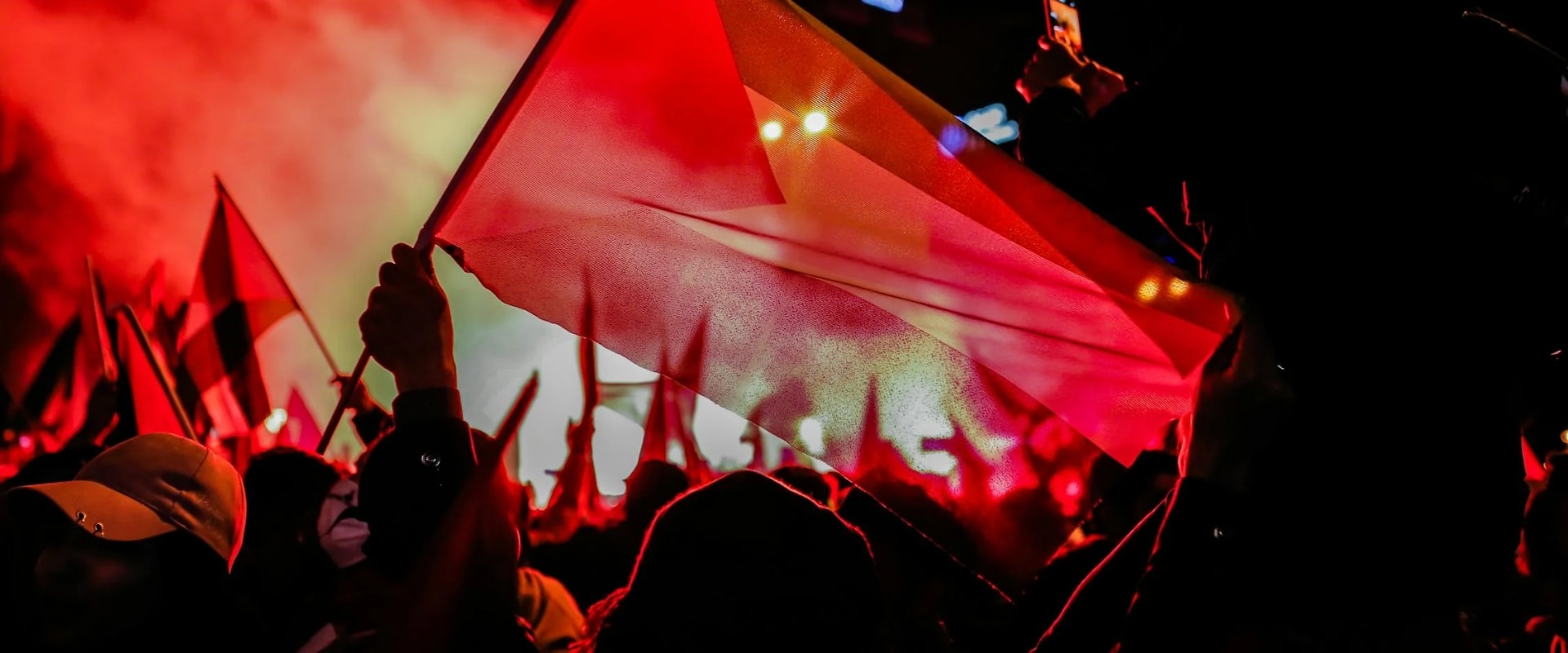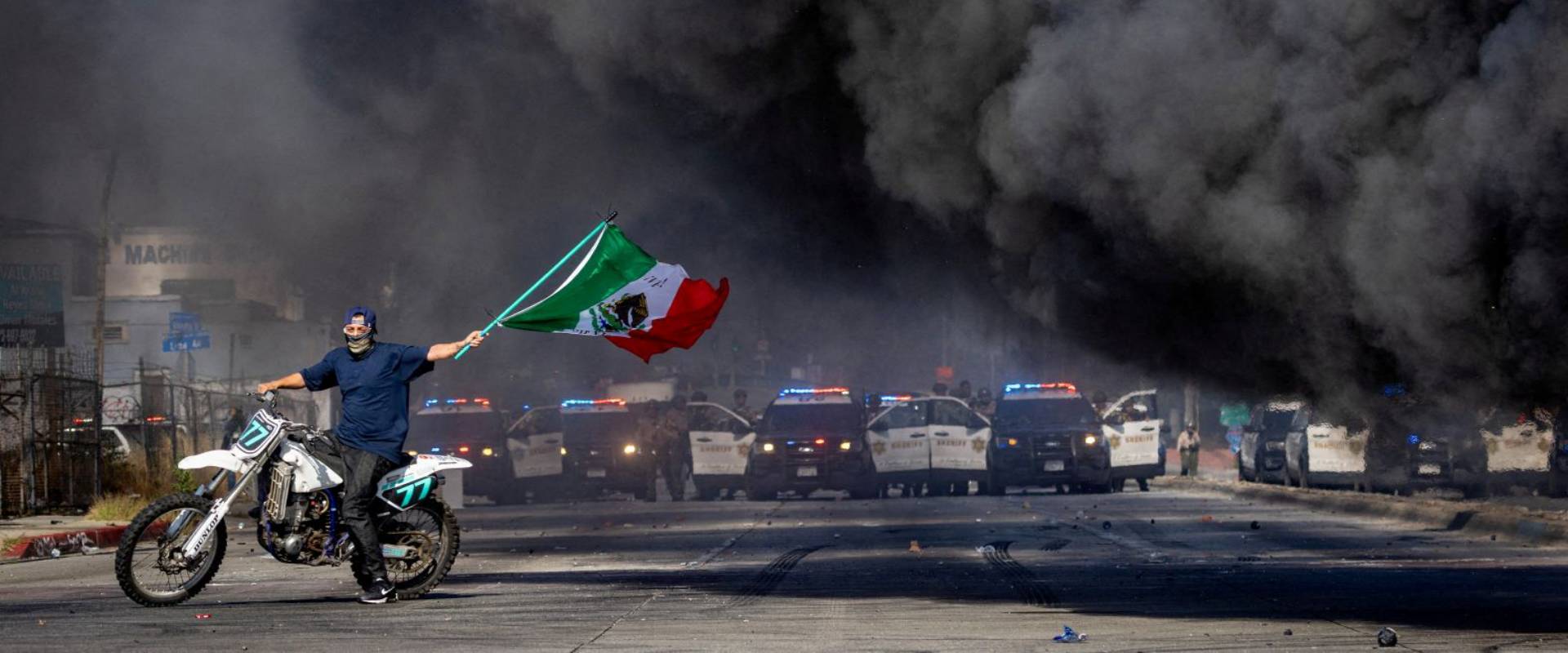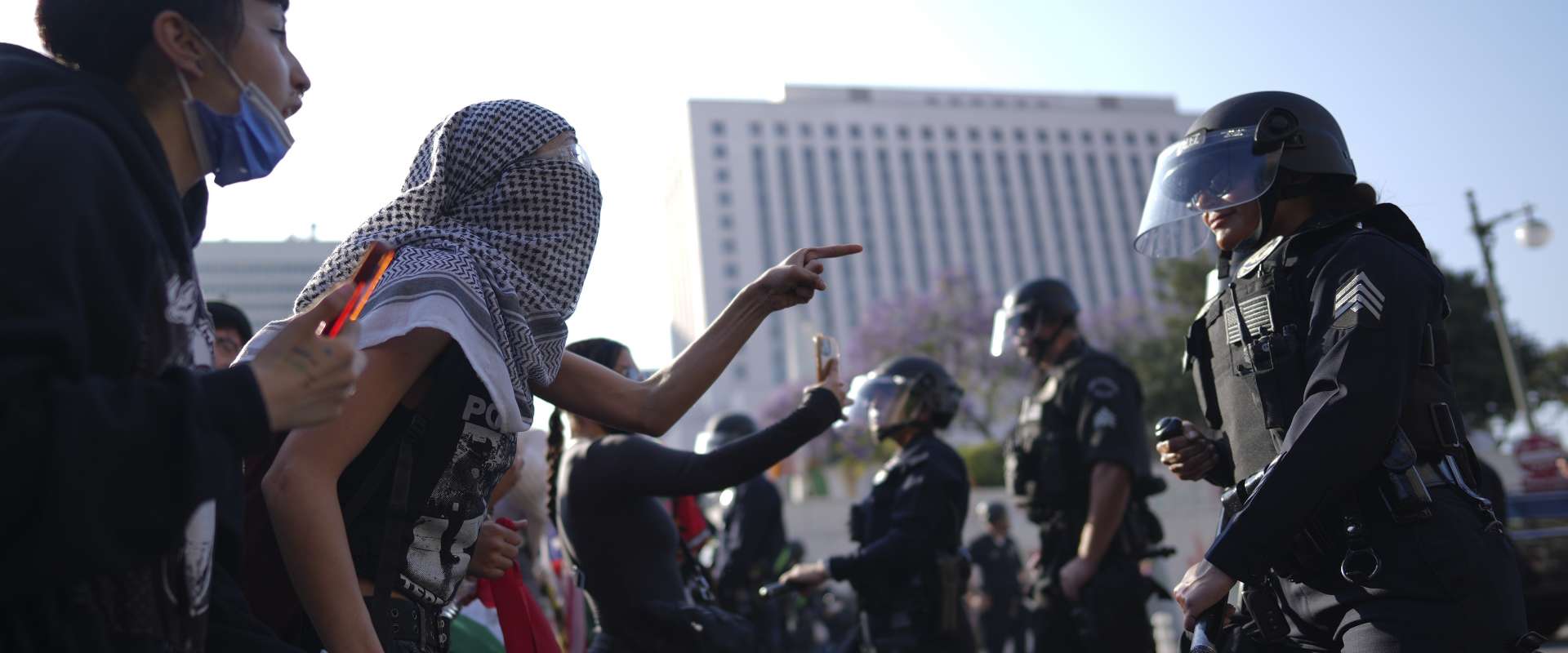A free Palestine from the river to the sea is the demand that has been taken up by the unprecedented global protest movement in the wake of Israel’s brutal war and genocide in Gaza. Most sincere supporters of the Palestinian cause can understand why the dismantling of the oppressive Zionist apartheid state and the creation of a free, democratic, and secular Palestine are the only objectives worth fighting for. Anything less — such as a “two-state solution” — should be rejected.
But what will it actually take to achieve a free Palestine?
Let’s start by stating something obvious: the first step towards the liberation of Palestine is the resistance that’s taking place in Palestine itself. Palestinians have always fought back against Zionism, even before the creation of the Zionist state; and they’ve fought back in many ways, from strikes to mass protests to armed struggle. If they hadn’t, then the issue would never have been raised around the world. Resistance is justified, it is necessary, and it should be supported internationally on that basis alone.
Once we’ve established that, let’s take a deeper look at what Palestinian liberation means. A free Palestine is one that upholds civic, political, and democratic rights for everyone, in contrast to a state where only people of a given religion have full rights. It also means the right of return of all Palestinians and all their descendants to the land that they were expelled from, and the return of the land itself to the Palestinians — from the river to the sea, it bears repeating.
And finally, it means ending the Zionist entity: that is, a full replacement of the current Zionist state with a free Palestine, not a two-state solution. The two-state solution is a proposal that is both undesirable and unrealistic. A look at the history of the Zionist colonial project over the past 76 years shows that it would never be willingly granted by the Zionists and their imperialist partners in the West.
But even if it were possible, it would simply mean a smaller Zionist state. Such a state would still be based on dispossession and oppression of the Palestinians — the rightful owners of the land.
This is why we adamantly reject a two-state solution. We’re for one liberated state: a fully democratic, non-sectarian Palestine with equal rights for all.
A free Palestine under capitalism?
Now the question comes up: is any of this possible under capitalism? As things stand now, with capitalism in crisis amid the current landscape of multipolar imperialism, it is very unlikely. Israel is all-important for Western imperialist interests in the Middle East region. This is why Western leaders have defended Israel so staunchly even as a horrifying genocide unfolds for the world to see.
But let’s consider what it would be like if the overthrow of Zionism were possible under capitalism. The best we can hope for is a situation like the one in South Africa after the downfall of apartheid in 1994. There, formal apartheid was ended because of the heroic and persistent mass struggle of the people over decades. The post-apartheid government instituted one person, one vote; equality under the law for all; and many other reforms.
Even if it were possible to end Zionism before we overthrow capitalism, we must admit that a free Palestine under capitalism would face problems similar to post-apartheid South Africa. The biggest share of the wealth would still be among the Zionists, and Palestinians would largely still be poor and oppressed (though perhaps a few more Palestinians would join the capitalist class).
But what have the material results been under South African capitalism? As undeniably necessary as the reforms were, we can’t deny that a form of economic apartheid still exists in South Africa. There is mass poverty among the Black population, and concentration of wealth primarily among the ruling class — many of them hailing, unsurprisingly, from the white minority who were the oppressors under apartheid. So the social and political revolution against South African apartheid was incomplete to say the least.
Even if it were possible to end Zionism before we overthrow capitalism, we must admit that a free Palestine under capitalism would face similar problems. The biggest share of the wealth would still be among the Zionists, and Palestinians would largely still be poor and oppressed (though perhaps a few more Palestinians would join the capitalist class).
For another illustration of this quandary, all we have to do is look at the United States and its ongoing racial inequality more than 150 years after the end of slavery, and more than 50 years after the end of formal segregation. According to the law in the US, Black people and white people are equal. And yet we know what the reality is: institutional racism, economic inequality, mass imprisonment, police brutality.
In fact a socialist society is the only way to have full equality. Only economic equality can insure lasting political and civic equality.
No revolutionary hope in the Israeli working class
But who can bring about socialism in Palestine? When it comes to assessing the possibility of social transformation in a given capitalist state, Marxists usually look to the working class. This is the class that is exploited by capitalists, and the class that produces the wealth of the nation. Therefore it has an interest in overthrowing capitalism, as well as the potential economic power to do so.
The case of Israel is a special exception to this rule. Marxists do not look to the Israeli Jewish working class as a force that can transform and overthrow Zionism.
Supporters of Palestinian liberation cannot depend on the US giving up on its Zionist ally. It is more realistic to imagine the downfall of US imperialism.
There are a number of material reasons for this. Israeli Jewish workers took direct part in the ethnic cleansing and settlement of Palestine (and still do to this day). Financially speaking, compared to other workers around the world, they greatly benefit from the Zionist government’s settler project — from high rates of social welfare to grants of stolen land. Most Israeli Jewish workers have served in the IOF and have been intimately involved in oppressing Palestinians. They are furthermore deeply invested in the permanent wartime economy and culture that has prevailed since the 1967 war.
Finally, there is a vast social gulf separating Israeli Jewish workers and Palestinians due to the apartheid system. Most Jewish workers have little contact with Palestinians, even fellow Palestinian workers, preventing the kind of solidarity that develops between racial groups in the working classes of other countries.
The massive imperialist subsidies from the US and other Western nations ensure that these economic and social arrangements will continue.
The bottom line is that the continuance of the Zionist state is very much in the material interests of the Jewish working class, and Palestinian liberation is against their interests. Thus, racism against Palestinians is deeply entrenched by the social structure of the state.
Israeli Jews will never embrace Palestinian liberation or turn against the Zionist government and their own interests in large enough numbers to make a social revolution within the 1967 borders. This has been objectively demonstrated over and over by all who have studied and observed the Israeli working class.
One illustration of how all this shapes social attitudes in Israel are the polls showing that upwards of 90% of the Jewish population supports the genocide in Gaza.
We don’t argue that Israeli Jewish workers are intrinsically bad or hateful people. Of course there are a few heroic individuals of conscience, including draft resisters and leftists who protest the war and the apartheid system. These individuals show that humanity can prevail even in the most racist environments.
But we must analyze the Israeli working class as a whole. As a class, their racism and toxic attitudes stem from the structure of the Israeli state and its settler-colonial nature, and this is very unlikely to change in the current conditions.
The vicious cycle of Zionism and imperialism
Because Israel is a settler-colonial state, it is naturally hostile to the people of the region, both Palestinians and the neighboring Arab-majority countries. The 76 years since the founding of the Zionist state have been characterized by continual genocidal violence against the Palestinians and militarism and aggression in the region. This hostility means that Zionism has always required imperialist support in order to prop it up. First the British, then the French, then the Soviet Union, and now the US have all taken their turns as the imperialist backers of the Zionist project.
The US benefits from this arrangement, first of all because it needs a stable ally in the region. Israel’s settler-colonialist project makes it an ideal candidate for such a partnership with US imperialism. Settler-colonialism is naturally compatible with imperialism.
An illustration of this compatibility is that Israel is useful to the US even outside the Middle East. The US has benefitted from Israel’s support of apartheid South Africa, and its interventions in Central America. More recently the IOF has established relationships with many police forces in the US, providing training and spy technology.
Thus a vicious cycle is created: imperialist support for Israel is based on its settler-colonial nature, and its settler-colonial nature requires imperialist support.
The US has never wavered in its support for Israel — this has always been a bipartisan policy. Both the Republicans and the Democrats have been consistently and staunchly Zionist. For example, all of the Democratic members of Congress who are now calling for a ceasefire still support the state of Israel on principle. They may issue statements about excessive bloodshed, but they continue to back Zionism, the cause of that bloodshed.
In 1986, then-Senator Joe Biden infamously said,
I think it’s about time that we stop apologizing for our support for Israel. There’s no apology to be made — none. It’s the best three-billion-dollar investment we make. Were it not for Israel, the United States of America would have to invent an Israel to protect her interests in the region.
It is extremely unlikely that this longstanding, unshakeable support for Israel on the part of the entire US ruling class would ever change in a meaningful way.
As Israeli anti-Zionists and socialists Jabra Nicola and Moshe Machover wrote in 1969:
The Palestinian people are waging a battle where they confront Zionism, which is supported by imperialism; from the rear they are menaced by the Arab regimes and Arab reaction, which are also supported by imperialism. As long as imperialism has a real stake in the Middle East, it is unlikely to withdraw its support for Zionism, its natural ally, and to permit its overthrow. It will defend it to the last drop of Arab oil.
Supporters of Palestinian liberation cannot depend on the US giving up on its Zionist ally. It is more realistic to imagine the downfall of US imperialism.
This is why our strategy for anti-Zionism must be anti-imperialist. Only when US imperialism is overthrown or so weakened that it cannot aid the Israeli state will Zionism end.
The role of the regional Arab working classes
At the same time, imperialist interest and domination in the region cannot be shattered without overthrowing those junior partners of imperialist exploitation that constitute the ruling classes in the Arab world. As things stand now, under the sway of US imperialism, most Arab states support Israel. Their historic anti-Zionist rhetoric may continue, but their pro-Israeli actions speak louder — especially with the normalization process and treaties such the Abraham Accords.
As Sumaya Awad and brian bean argued in Palestine: A Socialist Introduction, the entrenchment of neoliberalism
drew various Arab states together with Israel into a single economic zone under the domination of US economic power. This has created an environment materially connecting the Arab countries of the region with Israel, thus investing the interests of national capitalists with that of settler-colonial Israel.
However, though the ruling classes of the Arab states support Israel, the Arab masses do not. The Arab working classes and peasantry have shown over and over again that they oppose the state of Israel.
The overthrow of Zionism must be part of a regional and international revolution. Only such a revolution can be strong enough to challenge the state of Israel and its imperialist backers. Only such a revolution can alter the material and social relations of the Israeli state, and therefore win some of the Israeli working class over to support for Palestinian liberation.
Furthermore, the Arab working classes are the ones with the economic clout to really challenge the Israeli state, because they have the potential to overthrow the Arab states that are the lynchpin of imperialist control of the region. The Arab Spring of 2011 dramatically showed that potential. So did the uprisings in the broader region in 2019. These rebellions had a strong internationalist tendency: many of the protesters made it clear that they looked past their own borders for the source of their problems. They were opposed to neoliberalism, and to Zionism as well.
The overthrow of Zionism must be part of a regional and international revolution. Only such a revolution can be strong enough to challenge the state of Israel and its imperialist backers. Only such a revolution can alter the material and social relations of the Israeli state, and therefore win some of the Israeli working class over to support for Palestinian liberation. As the old slogan goes, “the road to Jerusalem begins in Cairo, Damascus, and Amman.”
Intifada until victory
So what does all of this mean for supporters of Palestine in the US? First of all we need to support Palestinian resistance by any means necessary, with no moralistic qualms. This is the most basic and urgent way to show our solidarity.
We need to organize workers here in the US to use their economic power against Zionism and against US imperialism. We need to support the boycott, divest, and sanctions movement (BDS). We need to fight for the right to protest — opposing the repression of student organizations and other activist groups, and opposing the laws that are being put forward against BDS.
We need to reject the Zionist, imperialist Democratic Party, and reject all organizations on the left that legitimize it, including the Democratic Socialists of America (DSA). There is increasing disillusionment with the Democrats among the young, the oppressed, and supporters of Palestine. We need to speak to that disillusionment and organize among those demographics.
We need to challenge all aspects of US imperialism, not just on Palestine. The weaker US imperialism is, the less it can aid Israel. And this means opposing US interventions in other conflicts, such as the Ukraine war.
We need to understand that imperialism is not just a policy, it is instead integral to capitalism. The economic competition which is the foundation of capitalism yields military competition. To end imperialism and war, we need to end the system that causes it. To overthrow imperialism, we must end capitalism.
As Awad and bean put it,
we need a rupture that pushes beyond the conception of a capitalist state, a revolutionary struggle not only within occupied Palestine, but also in the streets of the Arab capitals across the region, and among workers in the imperialist countries… Just as we cannot conceive of Zionism and the occupation in isolation, we cannot conceive of Palestine as a purely national question.
To quote one of the most inspiring and relevant slogans of the current movement, we need to globalize the intifada.
As revolutionary socialists, we need to support every struggle against exploitation and oppression. We see every struggle as connected. Every struggle contributes to the weakening and finally, hopefully, the overthrow of capitalism.
However it happens, Palestinian liberation is going to be a very hard struggle. For us in the US, a central part of our role in that struggle is developing a revolutionary party that can organize the fight against capitalism.



